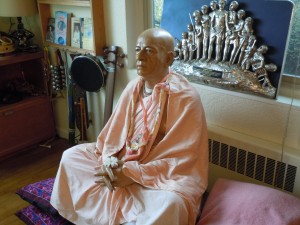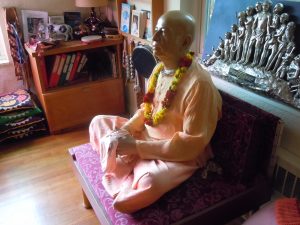Hare Krsna
Below is a short description of exactly how the impersonalists do their “meditation”. Srila Prabhupada also explains the evolution of human consciousness (life after life) from gross matter (materialists) up to spirit and how that kind of individual takes to certain types of worship. Finally at the end he explains how, except for the devotee, everyone is giving trouble to God with our own “plans”.
But the real plan is to surrender, thats all.
damaghosa das
——————————
Srila Bhaktisiddhanta Sarasvati App day Feb 15 1971
…Say, for meditation, it is very difficult to meditate on impersonal feature. Therefore, they artificially think like that: “I am the whole. I am moving the stars, I am moving the moon.” Or some color display is taking place. Artificially. This meditation is artificial. Therefore, they do not get any result. Simply waste time, and they remain the number one debauch, as they are. So this kind ofmeditation… Because they will not put any form… “The Brahman is impersonal.” So how they can think of any form? It is very difficult to adjust. Therefore Bhagavad-gītā says, kleśo ‘dhikatarasteṣām [Bg. 12.5]. They want to meditate upon impersonal Brahman, but it is verytroublesome. Because Brahman is not impersonal, but force, they want to make Brahmanimpersonal.
So in order to mitigate this troublesome position, some of their ācāryas, Śaṅkarācārya, has said that “You imagine a form. There is no real form, but you imagine some form.” And he has recommended five forms. The first form is Durgā, Śakti. The second form is Sūrya, the sun, sun worshiper. And the third form is Gaṇeśa, and the fourth form is Śiva. And the fifth form is Viṣṇu. Of course, these are the different stages of spiritual development. Durgā… Durgā meansthe material power, energy. So when a person is in the lowest stage of material existence, he realizes some power. That’s a fact. The scientists also, they realize some power, there is some power in the material world. They go on searching after what is the ultimate power, but they cannot find it out. That is not possible. But they accept that there is some power, nature’s power. So that isthe stage of śakta stage, Durgā worship. Then… Power… Just like modern scientists, they also have gone to the power of the sun. That power, another power. That power is sun, and that is called saura, worshiping the sun. Just like there is a Parsi community in India. Fire worship is recommended in the Vedas. So that powerful sun, sun-god, they worship the sun. That is the stage of saura, saura stage. And then, next is the power vox populi, the power of the votes. That is thestage of Gaṇapati. Gaṇa… Gaṇa means the number of people. Just like in nationalism they are counting upon the power. In this way, they realize some sort of power, I mean to say, moving force or the soul. That is the stage of… They say, śivo ‘ham. Śivo ‘ham. Ahaṁ brahmāsmi. That is thestage of śaiva. And when they expand that, that “This power, this spiritual power, soul, is all over, all-pervading, impersonal Brahman,” that is… They, sometimes they accept Viṣṇu. Viṣṇu means all-pervading. But their realization of Viṣṇu is impersonal.
When Caitanya Mahāprabhu was discussing with Rāmānanda Rāya what is the process of elevation, sādhya, sādhana, what is the ultimate objective, Rāmānanda Rāya quoted a verse from the Viṣṇu Purāṇa that,
varṇāśramācāravatā
puruṣeṇa paraḥ pumān
viṣṇur ārādhyate panthā
nānyat tat–toṣa–kāraṇam
[Cc. Madhya 8.58]
…So this bodily development given by the nature is also adduced to the body of Kṛṣṇa. That isMāyāvādī philosophy. Māyāvādī philosophy means they accept Kṛṣṇa as God, but He has assumed a body which is given by this material nature, as it is given to us. That is their policy. They count Kṛṣṇa an ordinary man, on the same level. But that is not a fact. Therefore Kṛṣṇacondemns this philosophy, avajānanti māṁ mūḍhā mānuṣīṁ tanum āśritam [Bg. 9.11]. “Because Iappear as a human being, therefore these rascals consider that I am ordinary man.” The rascals,mūḍhāḥ. Mūḍhāḥ means rascals, gādhāḥ, asses. Their designation is given by Kṛṣṇa as asses, rascals.
There is a Bengali proverb that how God works, that one man, a householder is praying to God, “My dear Lord, there may not be any theft case, burglary, in my home this night. Please save me.” So one man is praying prayer, praying like that. Another man is praying, the thief, “My dear Lord, this night I shall commit burglary in that house. Please help me to get something.” Now, what is Kṛṣṇa’s position? (laughter) Kṛṣṇa is everyone’s heart. So Kṛṣṇa has to satisfy so many prayers.The burglar and the thief and the householder, so many prayers. So Kṛṣṇa’s adjustment… But He’s still… That is Kṛṣṇa’s intelligence, how He adjusts. He gives everyone freedom. And everyone is given facilities, but still He’s in botheration. Therefore Kṛṣṇa advises to his devotees that “Don’t plan anything. You rascal, you nonsense, you don’t give Me trouble. (laughter) Please surrender unto Me. Just go under My plan; you’ll be happy. You are making plan, you are unhappy; I am also unhappy. I am also unhappy. (laughter) So many plans are coming daily, and I’ll have to fulfill.” But He’s merciful. If a… Ye yathā māṁ prapadyante tāṁs… [Bg. 4.11].



